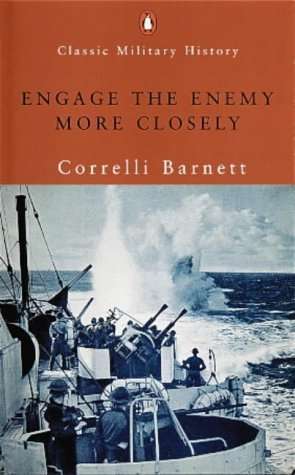Corelli Barnett is a polemicist about British decline as much as he is an historian. Sometimes his rhetoric could go a little 'over the top' but he made a good case. He saw a British elite behaving as if the UK was as great a Power in the middle of the twentieth century as it had been in the nineteenth. Nevertheless, his powers as a historian always kept him well within the bounds of reality. The facts dictated the story. In that context, this book (published in 1991) has multiple virtues as both corrective to received ideas and as a chronological narrative. It is a weighty tome. Barnett is not shy of offering precise details of ship movements and tonnages but, if you slide over these as you are so inclined, you will get both a sound strategic overview of British naval power in the Second World War and some very exciting stories. Let us take the second first. He takes us to the heart of the naval achievement under the heroic organiser Admiral Ramsay in abstracting thousands of defeated troops from the shore at Dunkirk in 1940. Then there is Cunningham's achievement at the Battle of Cape Matapan in 1941 which defeated the Italian Grand Fleet in the type of sea battle that might have been a throw-back to the great age of Nelson. It was indeed the last British naval fleet action.
Barnett also takes us deep into the only naval battle that was truly existential to the British - that for the Atlantic which Admiral Donitz nearly won. He explains its importance and why it was such a 'close-run thing'. Donitz was still capable of re-starting the Battle with new and superior submarine resources very late in the war as Germany itself was falling to land armies. Hitler made Donitz his successor for a reason and one of them is that he did not let him down.I remain persuaded that the British Empire was never not going to survive the war in some form - its historic trading links and scale gave it the luxury of a certain inertia - but time and time again we see superior innovation or ability to scale up production in both Germany and the US. This alone leads to US displacement of the British Empire. One might be grateful that the Presidency was held by an anglophiliac East Coaster and not someone with the views of Admiral King or Joe Kennedy. The Battle of the Atlantic had certainly demanded close Anglo-American naval co-operation. This developed in response to events rapidly. Once it was decided that Germany must be brought to heel, the UK became the absolutely necessary launch pad for a military schwerpunkt. That meant that the British people had to survive much as the Arctic Convoys sent a signal that the Soviet Army had to keep driving forward. From this perspective, the U-Boat War was perhaps not only the most dangerous existential threat to the British people since the Norman invasion but a threat not so much of German dominance of Europe as, as things started to turn out by 1944, Soviet dominance.
From the library of an prominent academic.

